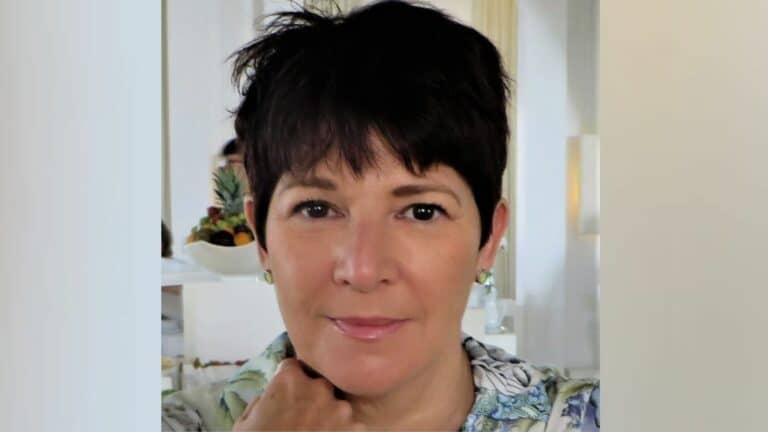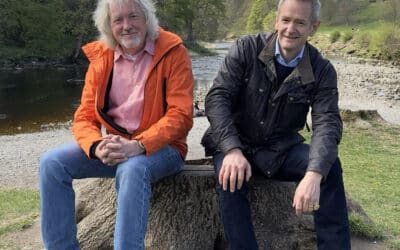It was hailed as a “defining moment” by Sir Roger Marsh, former chair of the Leeds City Region Partnership, when Leeds ‘unexpectedly’ won the bid for Channel 4’s national HQ back in 2018.
Both Screen Yorkshire and Leeds City Region worked “tirelessly” on the bid for the broadcaster to relocate to Yorkshire after fighting off stiff competition from other leading Northern cities such as Liverpool, Greater Manchester and Sheffield.
When Leeds was unveiled as the winning city five years ago, Sir Roger Marsh said it would “unlock the potential of the region” while former chief executive of Screen Yorkshire, Sally Joynson, said it had the potential to make a “fundamental difference [to] the DNA of Channel 4”.
As Channel 4 has now settled into its national HQ, based on the site of the former Majestic nightclub in the heart of Leeds that inspired the Kaiser Chiefs hit ‘I Predict A Riot’, has the self-professed “levelling up broadcaster” lived up to expectations?
We had a chat with Caroline Cooper Charles, chief executive of Screen Yorkshire, and Councillor James Lewis, leader of Leeds City Council, to dig into some elements of the initial bid proposal to find out…
“It has not been the smoothest five years”
It’s not been easy for Channel 4 over the years. The broadcaster wasn’t just grappling with the fallout from the Covid pandemic, threats of privatisation loomed too. Waged by former culture secretary Nadine Dorries, a welcomed u-turn came for the broadcaster to remain publicly owned from Michelle Donelan, now tech secretary, back in January.
Councillor James Lewis reflects on those challenges. “Covid had a global impact, we’re in different economic circumstances at the moment. When the government was looking at privatisation, it really had an impact,” he tells Prolific North.
“It delayed a consistent approach from Channel 4. It has not been the smoothest five years but I think, over time, that has settled down. The wider film and television industry is seeing Yorkshire as a real growth area at the moment, not just in terms of locations of studios and facilities, but we’re starting to see that some of the wider infrastructure around businesses that go on to develop talent.”
When former Screen Yorkshire chief executive Sally Joynson stepped down to retire, Caroline Cooper Charles took up the new position in 2021. With a career spanning 25 years across the screen industries, she agrees with Lewis on those initial challenges.
“Inevitably, the impact of the Channel 4 move is going to be a bit behind the curve of what we might have expected because we had Covid.
“The whole principle of commissioners being based in the region and being more accessible – no one was accessible to anybody at that time other than over Zoom. So that physical move, I think, will have obviously taken longer to really have effect and, sadly, the point at which we were really beginning to see those positive changes. Channel 4 is now fighting the impact of a downturn in advertising and an upturn in inflation.”
“There were eyes on Leeds”
Despite the setbacks, it hasn’t been all doom and gloom. From jobs to industry awareness, the move has been hailed as a positive for Leeds and the wider Yorkshire region.
“It probably did catalyse a lot of things both in terms of infrastructure, industry awareness and focus on what was happening in the screen industries in Yorkshire,” says Cooper Charles.
In what she believes was inspired by both the Channel 4 move and commitment by Leeds City Council, and the Leeds City Region Enterprise Partnership (LEP) at the time, Versa Studios opened a film and TV production base in Leeds spanning over 130,000 sq ft, now used by the likes of Disney and Netflix. The move has also accelerated activity across the post-production sector across Yorkshire too.
“True North has expanded its post-production facilities now. What was once an in-house operation, they’re now operating as a facility for other production companies. We’ve definitely seen some shifts in the post-production sector as a result.
“I think it builds confidence, there were eyes on Leeds. In terms of the education sector, we’ve seen the National Film and Television School open up in Leeds, the MetFilm School opened up in Leeds, and then other national organisations such as Pact having their regional headquarters in Leeds. It has become a bit of a bit of a go-to center in the North for some of those national organisations.”

Lewis agrees: “The direct impact you see is in the growth in studio space. But there’s production and tech, training and development. The wider pull of industry is definitely looking at Leeds and West Yorkshire as a place they want to be based in.”
Regional impact, jobs and talent
Initial forecasts suggested Channel 4’s relocation to Leeds could directly contribute to the creation of more than 1,200 jobs and have an economic impact of more than £1bn over the next decade across the Leeds City Region.
“It’s hard to really split out exactly who’s done what but across West Yorkshire, we’ve seen more than 1,200 jobs created in the sector. Not everybody in the sector wholly or directly supplies Channel 4, but the growth has been significant,” explains Lewis.
Employment has accelerated by 98% across the screen industries in Yorkshire too, says Cooper Charles. The current figures run from 2016 to 2021, rising from 4,900 to more than 9,700 and “it’s still growing”.
At the time of the announcement, Channel 4’s chief executive Alex Mahon said Leeds had put forward a “compelling and ambitious strategy” to further build the “strong independent production sector in the city and develop new diverse talent from across the region”.
Undoubtedly there’s been successes in developing that talent pipeline across the North. A snippet of the talent initiatives includes 4Schools, an initiative launched in 2022 aimed at encouraging young people from all backgrounds to pursue a career in the creative industry.
Channel 4’s Content Creative training programme, designed to help young people from disadvantaged backgrounds to take their first steps in the creative industry, has seen the likes of Born Ugly, Chief, Consume Communications, CreativeRace, Denstu Creative, Dubit, ITV Studios, Jaywing, Leeds 2023, McCann, Social, and Wise Owl Films training up the next generation of talent.

There’s also been support for “smaller, but very important” local initiatives too such as supporting the Unit in Bradford, a hub for supporting upcoming talent from the Bradford community.
“The reach is not solely focused on Leeds. Channel 4 is tapping in at a more local level to those younger communities as well, which I think is really important. They are obviously running numerous skills and training initiatives with a big focus on digital and the opportunities around it,” says Cooper Charles.
Indie troubles
In August, Channel 4 announced plans to offer specialist training and business support to smaller indies to “help them navigate unprecedented challenges facing the broadcast industry” through the 4Skills Business Boost.
Those unprecedented challenges have had a major impact on smaller indies across the region – and Channel 4 commissions too. Award-winning Yorkshire school drama Ackley Bridge, produced by The Forge and filmed in Halifax, is just one of the shows that has been axed and most recently, Steph’s Packed Lunch was another surprise casualty.
Broadcast since 2020 and based in Leeds Dock, the show has transformed the area into somewhat of a “Hollywood Boulevard”, sparking a flurry of activity with creative businesses moving to the region.

Channel 4 said the show will come to an end in December after around 700 episodes, blaming “audience habits” in a statement and that it didn’t “best drive” its digital-first strategy.
But some indies are frustrated with Channel 4 thanks to a commissioning slowdown. Chief content officer Ian Katz said back in September that the broadcaster “would not return to 2022 levels of commissioning” for some time, fuelling concerns over Channel 4’s commercial health.
“Production companies based in Yorkshire are having to make some hard decisions”
It’s a complex picture that involves many layers, explains Cooper Charles. “The whole sector is challenged. I do think it’s unfortunate that often, when there are those sector-wide challenges, that the impact is felt more acutely for regional production companies than it might be elsewhere.
“Yorkshire, and to a certain extend the North of England, hasn’t been affected as negatively by things like the writers’ strike action for instance, because we’re less reliant on those big incoming studio shows. So that’s a positive, we’ve got a more diverse production economy, which has been able to withstand those sorts of shocks.
“But when you’re talking about the smaller scale production companies that tend to exist in the region, and perhaps not the ones that are owned by the super indies, they are really going to feel the effects because if they lose one commission, then it’s really big deal if you’ve got a relatively limited slate.
“I know from listening to production companies based in Yorkshire they’re having to make some hard decisions about whether they wait for a Channel 4 commission that might not come for a while but will have higher tariffs, and will ultimately be more beneficial to the production company than making that same program for a broadcaster who’s going to pay a lot less for it because their tariffs are lower. I don’t think it’s a simple picture at all.”
But having a national headquarters in the region has improved the “accessibility of commissioners”, so production teams across the North aren’t having to constantly fork out for costly trips down to London for a single meeting.
“It was hoped that would build confidence in the capability of production companies outside of London, and in Leeds and Yorkshire specifically. I think that has happened,” she emphasises, pointing to the Channel 4 Indie Growth Funds.
“There’s 18 in total that Channel 4 is invested in, and three of them are from Yorkshire. It’s quite a high proportion when you consider the fact that most of the screen industries are still centered around the capital. That’s something that we obviously can’t deny. Those companies have grown in size, stature and status.”
From Anna Hall’s documentary company Candor Productions success, to Duck Soup Films shooting its first series for Channel 4 called Dance School – production activity has blossomed “with the support of Channel 4 in terms of commissioning”.
“Obviously, there are challenges at the moment. You can’t deny that advertising revenues and inflation and all of those things are having an impact but I don’t think that has anything to do at all with where they are physically based.
“We’re all feeling more confident in spite of those challenges,” she adds.












